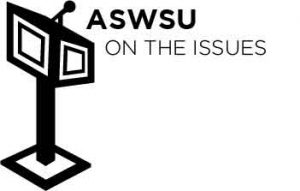Senator wants expanded cultural competency
Rogers says WSU’s deficit will become prominent issue during ASWSU elections
MICHAEL LINDER | The Daily Evergreen
ASWSU Senator Savannah Rogers describes her experiences with ASWSU and some future bills she is working on for the upcoming spring semester.
January 16, 2018
All-Campus Sen. Savannah Rogers is making campus climate one of her keystone issues this year on the ASWSU Senate. She started her first position in student government her freshman year, when she served on its communications committee. From there, she won the Honors Delegate seat on the Senate and followed with her current position. Rogers is an honors junior Public Relations and Political Science double major from Maple Valley.
Student’s biggest concerns
Rogers said the university’s fiscal issues would be among students’ greatest concerns spring semester.
University President Kirk Schulz launched a plan in October to curb WSU’s $30 million deficit by requiring all units to reduce their spending by 2.5 percent, eliminating the Performing Arts program and allowing vacant employee positions to remain open.
“I think last semester was only the start of cuts,” Rogers said. “Going into a budget crisis is never going to be fun.”
She said the ASWSU elections in March would likely highlight the situation, as students would be paying more attention to broader campus issues and worrying which parts of the university could be cut next.
“I think that puts not only administration, but this entire university and students in a really hard place,” Rogers said.
Expanding cultural competency training
Rogers sponsored a resolution, which later earned ASWSU President Jordan Frost’s signature, in support of mandatory cultural competency training for all faculty, staff and incoming students.
Her resolution came following a student-organized sit-in late August in the French Administration building, where students demanded the university administration implement the program.
At a meeting with the student activists in September, Schulz said training all faculty and staff would be logistically harder than doing so for incoming students, who could go through the program in large groups during orientation. Schulz said he supported the idea for faculty and staff too, but expected some to push back against required training.
Rogers said she learned a lot from cultural competency training sessions and believed they should be taught alongside mandatory violence prevention, sexual consent and substance use programs. She also wanted to make sure the expanded program would be effective.
“Do we do check-ins with these students afterwards?” Rogers asked. “How do we measure that? Or do we do it once and set them free onto campus for four years?”
Rogers said she hoped trial runs of larger-scale cultural competency training during 2018 orientation would answer those questions.
Campus climate
Rogers authored a resolution early fall 2017 semester “disavowing hate, racism, Nazism and white supremacy.”
She said last year’s College Republicans-organized Trump wall demonstration, the racist video published afterwards using footage from the demonstration and former College Republicans President James Allsup’s participation in the Charlottesville white supremacy rally strained campus climate.
“When we came back to school, campus was definitely a little tense,” Rogers said. “A lot of people felt like they couldn’t live here and they couldn’t learn here.”
She said it was important to show that student leaders were not complacent with discrimination.
GPA requirements for ASWSU Senators
Rogers proposed a bill to the Senate on Jan. 10 that would require senators to maintain a 2.5 cumulative GPA without earning a 2.3 GPA or below in any individual semester they are in office. The current policy requires senators to have a 2.3 cumulative GPA with no other stipulations.
“If you want to be in Athletics, if you want to be an Orientation Counselor, if you want to be a Cougar Connector, the GPA is 2.5,” Rogers said. “That’s the cutoff, that’s the minimum.”
In addition to holding ASWSU to higher standards, she said raising the bar would put them in line with other students in leadership positions. Critics on the Senate worried the change would impact freshmen who had less time to correct a low first-semester GPA.
Rogers said her proposed GPA requirements were reasonable and gave an opportunity for Senators to adjust after a challenging semester.
“You are a student leader,” she said. “That means a leader in the classroom as well, and that means a higher GPA.”











